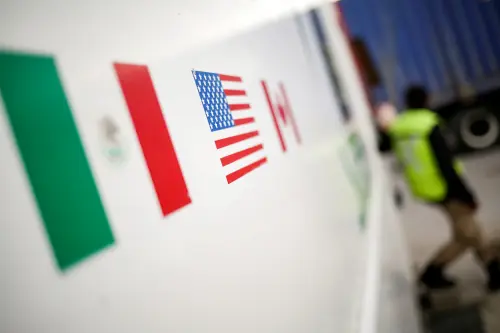Canada and Mexico secured protections against potential U.S. auto tariffs in 2018 as part of the U.S.-Mexico-Canada Agreement (USMCA), but there is concern that these commitments may not be honored amid new tariffs on global automotive imports.
The side letters to the USMCA, negotiated during Trump's first administration, provided for a 60-day delay on the imposition of global auto tariffs resulting from his initial Section 232 investigation into auto imports. Once this grace period concluded, Canada and Mexico were entitled to an annual duty-free import quota of 2.6 million passenger vehicles, alongside an unlimited number of light truck imports.
Additionally, the agreements established a duty-free quota for Mexico on annual parts imports valued at $108 billion and a $34.2 billion parts quota for Canada. Notably, for automotive products that do not comply with USMCA rules of origin, the Section 232 tariff could not exceed the rate in effect as of August 1, 2018, which effectively capped it at 2.5%. If upheld, this would benefit automakers that have been shipping vehicles made in Mexico to the U.S. at that tariff rate, including BMW.
As the 25% tariffs set to take effect on April 3 were reintroduced, the White House failed to reference the 2018 USMCA side-letter commitments, subjecting vehicles built in Mexico and Canada to these tariffs immediately. Officials indicated that the only exception for these countries was the deduction of U.S. content value from the tariffs on vehicles and parts produced in the U.S. Imports of auto parts from Canada and Mexico would remain duty-free until the Commerce Department determines a process for assessing U.S. content value, although no timeline has been established.
A separate concern is whether the deadline for the Section 232 auto tariffs has expired. Industry lobbyists noted that officials from the Trump administration are aware of this issue.
The Canadian government confirmed the terms of the USMCA auto side letters in an email and expressed confidence that the U.S. would uphold the agreements. It also retains the right to respond with retaliatory measures against U.S. Section 232 tariffs that diverge from USMCA and World Trade Organization obligations.
Mexico is currently assessing all legal aspects related to the USMCA and WTO, prioritizing the best interests of its consumers and producers, according to Luis Rosendo Gutierrez, the undersecretary for foreign trade in the Mexican Economy Ministry.
The Office of the USTR and the Commerce Department did not respond to inquiries on this issue. The White House, while not addressing the specific protections, emphasized the need for America to become a dominant manufacturing force, rather than just an assembler of foreign parts.
Canadian Prime Minister Mark Carney recently engaged in productive discussions with Trump, but did not secure commitments to ease tariffs on Canada and warned that retaliatory tariffs may follow Trump’s upcoming reciprocal tariff announcement.
The auto quotas were intended to facilitate modest growth in production in Mexico and Canada, and if honored, they would still surpass U.S. auto imports from these countries. The protections negotiated by Lighthizer were crucial in advancing USMCA negotiations concurrent with the auto trade probe.
Legal expert Dan Ujczo pointed out that the USMCA side letters were specifically designed to avoid the current predicament facing Canada and Mexico, which requires negotiations with U.S. tariffs looming over them. He noted that, towards the conclusion of USMCA negotiations in late 2019, the Trump administration provided tariff exemptions for Canadian and Mexican steel and aluminum imports, although these exemptions were subsequently rescinded.
Ujczo highlighted that the ultimate goal for the automotive sector, similar to steel and aluminum, is to boost domestic investment and readjust quotas while restricting Chinese original equipment manufacturers from entering the North American value chain. Lighthizer, previously considered for senior economic roles in Trump’s cabinet, declined to comment, directing inquiries to the USTR.
